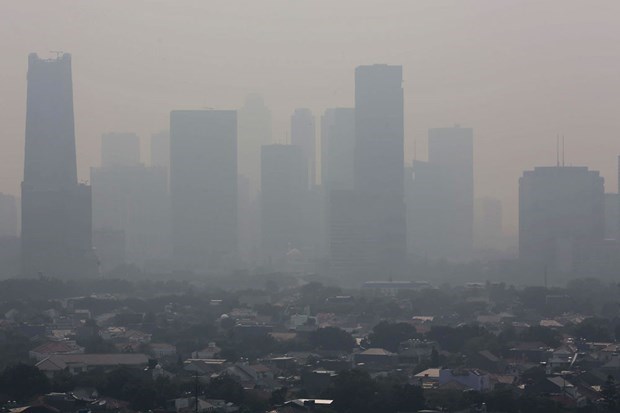Indonesia ranks fourth in pollution-related deaths
Indonesia has the fourth-highest number of premature pollution-related deaths in the world, according to a report by the Global Alliance on Health and Pollution (GAHP).

Jakarta is facing serious air pollution. (Photo: thejakartapost.com)
Indonesia has the fourth-highest number of premature pollution-related deaths in the world, according to a report by the Global Alliance on Health and Pollution (GAHP).
The Pollution and Health Metrics report revealed that over 230,000 Indonesians die every year because of exposure to toxic air, water or soil, or other forms of pollution.
Of the deaths, 123,753 were attributed to air pollution, 60,040 to water pollution, 16,331 to occupational pollution, and 32,850 from lead pollution due to exposure to emissions from leaded gasoline.
However, the total deaths were far below India and China, both of which recorded more than 1.8 million deaths, and slightly lower than Nigeria.
Countries ranked below Indonesia in the top 10 include Pakistan, Bangladesh and Ethiopia. In terms of the death rate, Indonesia ranked 75th in the world with 88 pollution-related deaths recorded per 100,000 people.
The report draws its data from the Institute for Health Metrics’ (IHME) 2017 Global Burden of Disease Study, noting that pollution remains the largest environmental cause of premature deaths by killing 8.3 million people, or nearly one death in seven globally, that year.
Pollution kills three times as many people a year as HIV/AIDS, tuberculosis and malaria combined. Pollution is responsible for 15 times the number of deaths caused by war and other forms of violence each year, the report says.
Rising modern pollution, caused by industrialisation and urbanisation, is responsible for 5.3 million of the global pollution-related deaths a year, the report notes. Air pollution is responsible for 40 percent of all pollution-related deaths, or an estimated 3.4 million deaths a year./.
VNA
 Malaysia, Singapore step up cooperation in environmental protection
Malaysia, Singapore step up cooperation in environmental protection
 Malaysia's digital economy projected to reach 31 billion USD in 2024
Malaysia's digital economy projected to reach 31 billion USD in 2024
 Opportunity to enhance the position of the Global South
Opportunity to enhance the position of the Global South
 Thailand to build new bridge to Cambodia
Thailand to build new bridge to Cambodia
 Bulgaria charts new course with Vietnam on President’s upcoming visit: Diplomat
Bulgaria charts new course with Vietnam on President’s upcoming visit: Diplomat
 Seminar seeks ways to boost ASEAN - Latin America connectivity
Seminar seeks ways to boost ASEAN - Latin America connectivity
 Indonesia seeks India's help in health education
Indonesia seeks India's help in health education
 Indonesia named world's most generous country in 2024
Indonesia named world's most generous country in 2024
 Philippines: Over-4m-high floodwaters make thousands of houses submerged
Philippines: Over-4m-high floodwaters make thousands of houses submerged
 Singapore’s public sector records carbon reduction in 2023
Singapore’s public sector records carbon reduction in 2023



